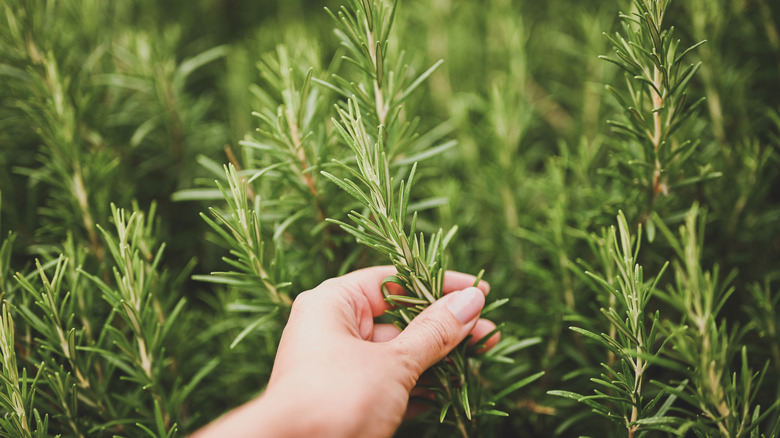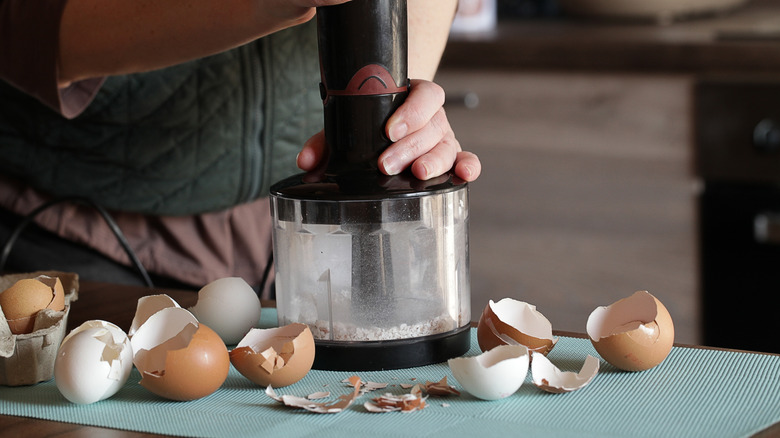The Natural Fertilizer That'll Help Your Rosemary Thrive Is Already In Your Kitchen
We may receive a commission on purchases made from links.
Eggs make a nutritious meal for plants as well as people. Unlike most humans, plants prefer the shells, which are rich in calcium carbonate. This mineral assists them with nutrient absorption and supplies the calcium they need to form sturdy cell walls and healthy root systems. Plus, eggshells have other unexpected uses in your garden, especially if it would benefit from a higher pH level. This is often the case when caring for rosemary plants (Salvia rosmarinus), which appreciate soil that's in the neutral-to-alkaline range. Adding eggshells to your soil makes it a bit less acidic, which may enhance the taste of your rosemary. That's because mildly alkaline soil tends to yield rosemary plants that are compact and extra flavorful.
What's more, eggshells deter slugs that munch on a range of leafy plants, help air move through your soil, and promote efficient water drainage, which is essential for discouraging root rot in rosemary. Your leftover eggshells are ideal rosemary fertilizer for another reason as well: They don't add much nitrogen to your soil. When rosemary receives more nitrogen than it needs, it is likely to grow too fast. When this happens, it tends to taste blander and experience more pathogen problems. If a soil test shows that your garden's calcium level is waning, eggshells can correct the deficiency without raising the risk of nitrogen overload.
Seeing suboptimal levels of other nutrients your rosemary needs? Give your garden a small springtime serving of fertilizer that's low in nitrogen and releases nutrients gradually. One option is Lilly Miller 4-10-10 Bulb & Bloom Food. But if the nutrient deficiencies are minor, eggshells might be able to address them.
Unlocking eggshell nutrients to bolster rosemary health
In addition to boosting your soil's calcium content, eggshells gradually supply other nutrients that support rosemary's wellbeing, including phosphorous and magnesium. However, your plants won't be able to extract these nutrients with ease if you just lob eggshells at your garden. Crushing or soaking the shells makes their vitamins and minerals more accessible to your rosemary.
Grinding your eggshells results in smaller pieces that decompose quicker in your garden. The sooner they biodegrade, the sooner they'll deposit nutrients into your soil. Many gardeners pulverize eggshells in a food processor or coffee bean grinder, but a rolling pin will work in a pinch. This creates a powder that's easy to sprinkle around the base of each plant that would benefit from its nutrients and pH-raising properties. You can also put the powder in planting holes or stir it into soil as you would with compost.
Though this powder is easy to create, consider making a liquid form of calcium-rich DIY eggshell fertilizer. Eggshell-based liquid fertilizers can be sprayed onto your rosemary's foliage, which accelerates the nutrient absorption process. Combine 1 tablespoon of eggshell powder with 1 cup of vinegar, and then let the mixture sit for two weeks. The vinegar dissolves the eggshells, helping to unleash their calcium. Since the resulting solution is high in acid, dilute it before feeding it to your rosemary. Add five parts water for every one part calcium concentrate.

